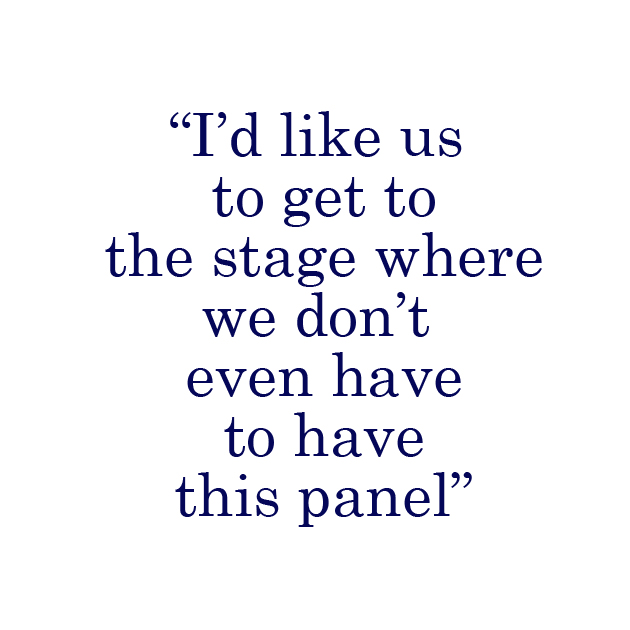Do we need to keep talking about the difference between male and female chefs?
When you work in the hospitality industry, the battle of the sexes is never far from discussion. This doesn’t just apply to the kitchen, women in hospitality is a hot topic in front of house too, on international Women's day, we take a deeper look.
- Should there be separate awards for female chefs?
- Why is there a shortage of female chefs?
- Top female chefs speak out about new figures showing 'a decline in women in professional kitchens'
It’s a double edged sword – we want to encourage women to be successful but we don’t want to categorise them in a way that makes them different to their male colleagues doing the same job.

It was clear, right from the off that Ruth had strong thoughts on the topic: “I’d like us to get to the stage where we don’t even have to have this panel because there is nothing to talk about. Why do we need to talk about the rise of women?”
So, do these discussions help or hinder women in hospitality?
“It does help a little bit – it’s like that little flashing light and all the flies fly to it!” Explained Sandia. “It’s attracting people and the more people we attract the more probability there is that the percentage of women will increase. I think we need to get more people involved and have more incentives for people to respect our industry as a career.”
Just last week, The World’s 50 Best announced Clare Smyth as the winner of their annual Best Female Chef Award, this always provokes a difference of opinion but as Daniel says ‘if we don’t have these awards we are not opening doors’.
He said: “Clare Smyth has turned around and said, ‘why is this award just for women?’. But if you really think about it girls will see that award and think ‘you know what she’s done really well, I can be the next Clare Smyth’.
“However, we should eventually get to a point where those awards have got to disappear because we are all the same.”
Ruth added: “It is a bit categorised – why can’t we just be The 50 Best Chefs? Why do the awards have to be separate? Would you do that with any other industry?”
Michael Wignall and Claude Bosi
Nespresso brought the panel together as part of their #TheDifferenceSheMakes campaign. They are encouraging more women to become coffee farmers in what is a male dominated industry and although the situation is very different to encouraging women into hospitality, they do believe ‘you have to put things in place to actually enable this change to happen’ – is this a message that is still yet to be heard and implemented in restaurants?
“The industry is changing and it can only do good for the industry if we are changing our attitudes,” said Michael.
“Having women in the kitchen brings a maturity to the boys. Having ten lads in the kitchen they can be a bit immature and laddish. A woman in the kitchen brings a sense of calm and definitely organisation, they are a lot more precise.”
Claude has five women in his kitchen and said: “My dream was to one day have a female head chef, I already have a fantastic head chef so I hope he is not hearing this, but I worked in a kitchen with a female head chef and 20 -30 years ago, you would not have wanted to be told off by a woman!”
Similarly, Daniel has always had girls in the kitchen and says, ‘there is no difference’.
“Everybody comes on a trial and you are looking for that passion, ability and want and drive. As chefs we work out of passion not because of what sex we are. If I had 12 women standing behind me in the kitchen I’d be a happy man because it’s 12 chefs and that’s what I need.”
He added: “We came into this industry because we love to cook and we love to please people, that hasn’t changed. We are here talking about men and women and there is no difference – if they care about what they are doing that is the most important thing.
“You can’t advertise ‘female chefs wanted’ can you? The point of the matter is, it needs to start in the schools and at home. Our industry needs to be flagged up a lot more before they leave school.”
"There are barely any young people who want to get into this trade because in the UK, it's difficult to get onto the butchery training course and you have to start at the very bottom. It takes years as you are essentially learning anatomy and it's hard to get people enthused about that."
Sandia, who started her career as a chef before moving into wine and becoming a sommelier, agrees that passion is more important than gender and said: “I was in the kitchen and I was one of the boys and I didn’t think of myself as different, then I moved on and went into the wine business which was the same . I didn’t think that just because I’m a woman, I don’t have to move all of those wine boxes. I did what I was supposed to because it was my job.
“Young women coming through the industry saying, ‘what can I do to be a successful woman in the industry?’, I’d say the first thing you have to do is stop thinking you are women in this industry. You’re just another passionate person in this industry and the moment you stop thinking you are different is the moment you are most likely to succeed.”


{{user.name}}